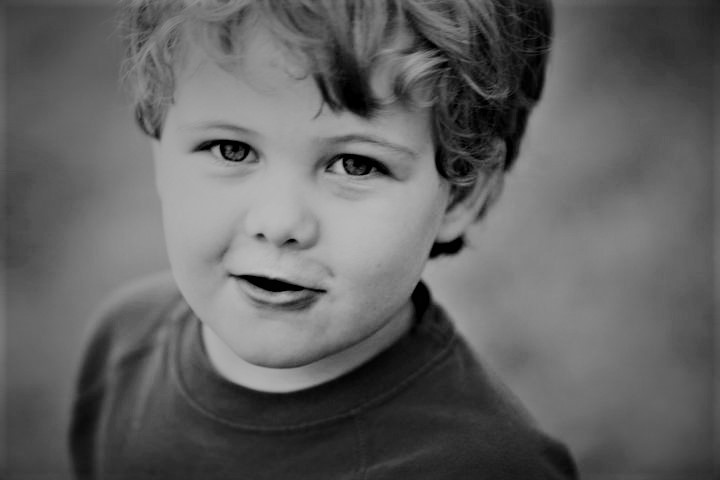 Author’s note: This post veers a bit to a niche audience. But my posts on what I’m learning from my son’s learning disorders—ADHD and dysgraphia—and this one on helping our kids turn suffering into praise have been perennially visited by whom I can only assume are parents hoping to adjust to similarly harrowing and frustrating diagnoses.
Author’s note: This post veers a bit to a niche audience. But my posts on what I’m learning from my son’s learning disorders—ADHD and dysgraphia—and this one on helping our kids turn suffering into praise have been perennially visited by whom I can only assume are parents hoping to adjust to similarly harrowing and frustrating diagnoses.
I’m not a doctor or an expert—just a parent who has found some gratitude in all this.
Six years ago, my heart wasn’t just gripped by preparations to heave our family of six over to Africa. It took only till September of my son’s kindergarten year to piece together that something wasn’t right.
Perhaps I should have seen it in the way he couldn’t pay attention to the end of a flashcard. Or that he had no friends to invite to his birthday aside from his brother’s buddies. Or that his mind was so regularly drifting from any reality at hand.
Why a Diagnosis Matters
The statistics, let alone my realization that in Africa, I would be one of his only advocates—wrapped around me like seaweed in an undertow. Depression. Addiction. Worse words I won’t use here.
But I’ll say this: This is why accurate diagnoses matter. Because diagnoses mean we can get help for our kids. (See this post on When You’re Afraid of Getting Your Child’s Behavioral Diagnosis).
We’re not planting our heads in the sand, hoping a label won’t stick to that son or daughter we love. We’re finally able to utilize tools that help them have a promising future.
Laying out six years of trial and error, of tears (his and mine), of miles of change for both of us isn’t possible in a single post. I can’t outline all the playdates where we installed extensive rewards and consequences for not melting down, yelling, or (yes) striking someone at a playdate.
I have formatted countless charts and chore to-do-index cards and teachers’ daily progress reports.
We have cried together over spelling lists that felt impossible.
Yet here’s what my son wrote recently in an endearing report about his disorder:
ADHD has some undeniable setbacks that make it almost impossible to function In the way people expect me to. But ADHD has more treasures than you think…
I agree with a Yale professor that people with ADHD tend to be creative, intuitive, tenacious and high-energy.
I am glad for the way I am. I am still amazed the way God made me.
And I will say–my original post was going to be an open letter to the God who gave my son this disorder. It was a letter of thanks.

Don’t misunderstand me. Someday I cannot wait to get to know my son in heaven, the fully-healed version.
The majority of ADHD is part of the disorder in our world. But as a wise adult friend with ADHD told me in those frightening beginning days, this is not just part of the Fall of humanity. God has good plans for this, too.
This is part of my son’s unique creation.
A gift?
Dr. Russell Barkley, who is my current favorite resource for this disorder, has said, “Do not misunderstand. ADHD is not a gift.”
What comes to mind is the poetry of Mary Oliver: Someone I loved once gave me/a box full of darkness. /It took me years to understand/that this, too, was a gift.
Because of ADHD, my son has unparalleled senses of creativity, perspective, and emotional and spiritual intuition. He also is the funniest, one of the most compassionate—some would even argue most loveable—member of our family.
Raising a child with ADHD can make you want to take a baseball bat to your soup tureen. It at times resembles how Jerry Seinfeld described life with toddlers: like running a blender with the lid off.
But I will argue that with a great deal of perseverance, help, and tight, consistent, immediate discipline, it’s also vibrant and full of depth. It requires much more involvement and advocacy than children without these obstacles–but as I recalled in this post and this post, God has showed me his own advocacy for me there.
ADHD for dummies, according to a non-doctor
ADHD is 90% genetic. It directly results from physiology of the brain involving three neurotransmitters and sort of neurological “vacuums” that suck up those (often under-produced) neurotransmitters. This means the nerves’ messages don’t finish their circuit.
On brain scans, the frontal lobe–which controls impulses, planning, emotional control, and other executive skills–looks sort of “asleep”. This is why medications are a form of methamphetamines–speed–to illuminate that frontal lobe.
Here are some ideas and resources that work for us. I’d love your comments below from your own experience. Let’s get a helpful dialogue going!
- Teachers and parents should keep eyes out for other concurrent learning disorders; 30% of ADHD sufferers have these.
- Understand, Barkley notes, that this is primarily a social disorder, deeply affecting our kids’ friendships. It’s also primarily a disorder of executive functions, seeing as how ADHD is based in the frontal lobe. It’s not as much about forgetfulness or being “spacey”; those occur, but people will forgive you for that. (Less so when you’re the kid who loses his temper and scatters Candy Land.) Because this is a “sleepy” frontal lobe, they lack impulse control. Barkley, in these very helpful tips, advises stronger and more immediate consequences and rewards to, in my understanding, lodge the cause and effects in the child’s brain (think Pavlov’s dogs, here).
- Structure is super-helpful for kids with ADHD. (They tend to succeed in the military and military schools!) As I’ve heard it described, it’s like their brains are flipping channels, and they can’t help it. Structure helps give them scaffolding to hang the rest of their day on—something to expect. The more you can give them lead time to expect changes, the better.
- Similarly, I have also found those with ADHD to be very black-and-white thinkers; my son, for example, very much loves rules and has a strong sense of (at times slightly miscalibrated) justice. We seek to help our son understand nuances and gray areas, and to avoid extremes and jumping to conclusions.
- For discipline and executive skills, Smart but Scattered is one of my top picks. I would isolate target behaviors we needed—no hitting during playdates, for example—and offer small, consistent reminders before the playdates and during, with quick responses on consequences (homeschooling gave me advantages in being able to respond right away). Since ADHD restrains both foresight or hindsight, again–consequences need to be embedded in their frontal lobe.
- Mornings are best for subjects and behaviors that demand a lot of attention.
- I find that when my son gets in a rut with his fears or whining or attitude, active time helps a lot. I tell him my observations (“clues”) about his behavior, and I ask what solutions he can think of. He prefers repetitive behaviors outside, which increase serotonin (the neurotransmitter) naturally. You can also increase serotonin by serving protein (its building blocks) at breakfast and lunch, when our bodies naturally make it.
- At the risk of opening a massive can o’ worms–after finding little success in natural methods, medication provided an immediate and clear result for us, particularly in social respects. (We do find results from Vitamin B complex gummy vitamins every morning.) ADHD meds inhibit the neurotransmitter “vacuums”, so the neural messages finish their circuit. We saw immediate improvements in relationships–including our ability to feel connected to him–and school performance, as well as moods (specifically a lot less whining!) and responsiveness. We realize that’s not for everyone, though these medications have been used and refined for over 50 years with a lot of solid science and research behind them. If your children do go on meds, realize those meds often change their metabolism; they’ll eat a big breakfast and dinner, but a small lunch, and may lose a little weight. Find common side effects here. Some parents who don’t use extended-release medications (which are well worth it for their consistency of medication throughout the day–a smooth plateau) often give more meds at homework time after school.
- For teaching life skills, this post has some key takeaways from another ADHD book. At the recommendations of the books below, I developed “good job charts” (you can see my printable ones here, that we now attach to screen time, which is very motivating for my son; video games have immediate consequences, which are super-rewarding for ADHD kids, for better or worse). For chores, I created index cards with step-by-step instructions and supplies he needed, since he has a hard time with the “file cabinet” in his brain—also known as executive skills, discussed in Smart but Scattered.
- For memorization, like multiplication facts, try them on flashcards with the answers on them, and then put them to a metronome (there are free apps or websites for this). Say them to the beat. My son has found the metronome soothing to him! (See related studies here.) Rap music and other music with a strong beat can also be soothing.
- For anxious times, I found it helpful to give my son “scripts” for what to expect. You can read about that a little here. (I’ve also compiled some ideas about helping kids through their fears here and here, and on dealing with kid drama without squashing emotion here and here. This post deals with some of the fears we face ourselves as parents!)
- This YouTube video—and Russell Barkley’s podcasts—have been really helpful for me.
His fact sheets are also great for some basic ideas on discipline.
- My favorite, most helpful books:
Smart but Scattered: The Revolutionary “Executive Skills” Approach to Helping Kids Reach their Potential (there’s a teen version now, too!)
How to Reach and Teach Kids with ADD/ADHD: Practical Techniques, Strategies, and Interventions (Great for teachers–but so helpful for involved parents, too)
The ADHD Book of Lists: A Practical Guide for Helping Children and Teens with Attention Deficit Disorders
Parents, I’m praying for you as I write—and trusting God knew exactly what He did in giving you those kids.
Edited: For those of you confused between ADD and ADHD–the DSM 5 (the latest version of the diagnostic and statistical manual for mental health professionals) has made ADHD all that’s left; there really is no “ADD” without the hyperactivity. (Barkley elaborates on this in one of his podcasts.)
Also, we’ve found the “Motivaider” app to be somewhat helpful in keeping our son on task.
And one statistic that’s been helpful for me to keep in mind: Developmentally, kids with ADHD lag an estimated 30% behind in maturity (the video above explains why). This helps me to manage my expectations with my son.
Help us out! What practical coping skills have been helpful for you as a parent or teacher of ADHD?
Like this post? You might like
When You’re Afraid of Getting Your Child’s Behavioral Diagnosis
Essential Social Skills for Kids (and Ideas to Teach Them), #1-4
When Your Child’s Weaknesses Feel Overwhelming
What I’m (Slowly) Learning from my Son’s Learning Disorders












![Now You're Speaking My [Love] Language Now You're Speaking My [Love] Language](https://www.janelbreitenstein.com/wp-content/uploads/2015/08/love-languages-text-1.jpg)





October 9, 2017 at 5:44 am
Thank you x so much information in one place. I/we really appreciate it x
October 9, 2017 at 3:10 pm
So grateful it’s helpful and that someone else can learn from our journey, Vicki!